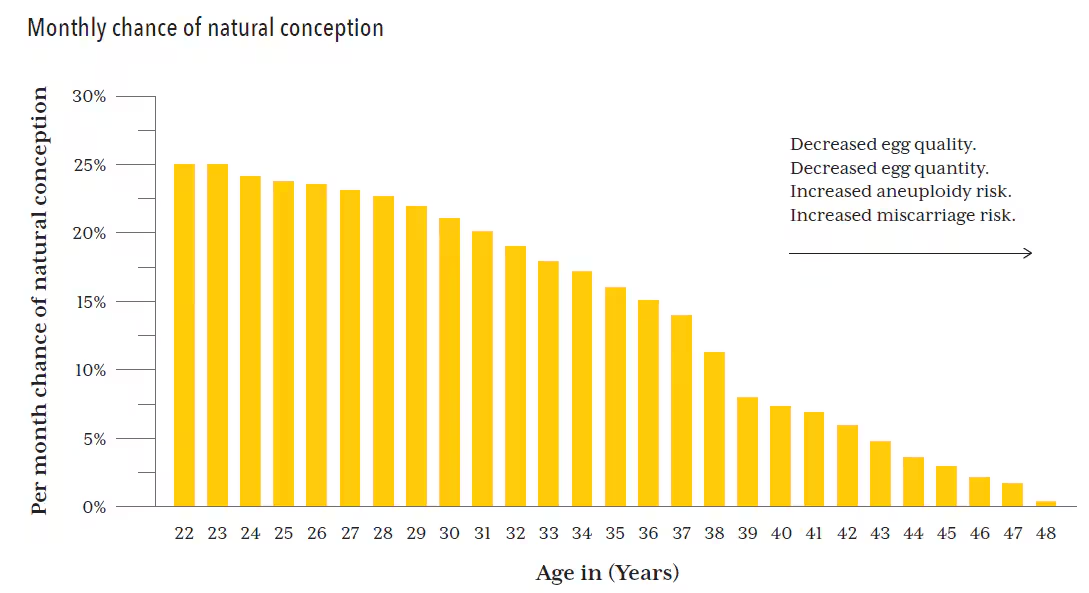The Influence of Age on Achieving a Healthy Pregnancy
As men and women age, the complexity of achieving a healthy pregnancy increases. At Genea, we provide essential insights into how age affects both genders and why early intervention could significantly enhance your chances of welcoming a healthy baby. Our Fertility Clinics offer specialized treatments like IVF, ICSI, and the egg freezing process, tailored to optimize your reproductive health at any age.
Female Age and Fertility: Facts and Figures
Despite high-profile stories of celebrities having babies in their 40s and advancements in IVF treatment, the reality is that age remains a significant barrier to starting a family for many women. At Genea, we provide clear, scientific insight into how age affects fertility, backed by our expert fertility specialists and advanced fertility clinic services.
By the age of 36, a womans chances of conceiving naturally each month decrease by nearly 50% from her most fertile years in her early 20s. This decline becomes even more pronounced by the age of 45, where the average monthly conception rate drops to just 1%. Its crucial for women considering later pregnancy to understand these statistics and plan accordingly.

Younger women facing infertility often encounter identifiable medical issues, such as blocked fallopian tubes or a partner with a low sperm count. In contrast, infertility in older women is often linked to decreased egg quality, and pregnancies are more susceptible to complications such as chromosomal abnormalities, frequently resulting in miscarriage within the first trimester.
Moreover, the influence of the male partner's age should not be underestimated. Men over 40 may experience a decline in fertility, marked by an increase in genetic defects in sperm, which can affect the couples ability to conceive and increase health risks for the child.
Additionally, having had a baby before does not exempt couples from fertility challenges. Approximately 10% of couples experience secondary infertility, struggling to conceive again despite previous success.
Male Age and Fertility: Understanding the Impact
Recent studies underline the significant role male age plays in reproductive outcomes. Typically, male fertility begins to decline around ages 40 to 45, marked by a decrease in sperm quality. This age-related change not only lowers the overall probability of conception but also extends the time required to achieve pregnancy and increases the risks of miscarriage and fetal anomalies. Children born to fathers aged 40 or older are at a fivefold increased risk of autism spectrum disorders and have a slightly higher chance of developing schizophrenia and other mental health issues later in life.
At Genea, we address these challenges with comprehensive fertility evaluations and treatments, assisting couples in understanding and managing the implications of advancing paternal age.
FAQs About Age and Fertility
Women are most fertile from their late teens to late twenties. After 30, fertility declines more rapidly. By age 36, the chance of conceiving each month drops to about half compared to early 20s, and by age 41, it decreases to just 4% per month.
This decline is due to a decrease in the number and quality of eggs. Women are born with about 2 million eggs, which reduce to around 400,000 by puberty, and continue to decline.
Men's fertility also diminishes with age, though less drastically than women's. Male factors account for over 40% of infertility cases, often influenced by sperm abnormalities and reduced sperm counts as they age.
Seeking Help for Age-Related Fertility Concerns
Couples in their late 30s and 40s should consider early investigation and consultation for fertility issues, particularly if facing specific challenges like blocked tubes. At Genea, we emphasize the importance of informed family planning and provide advanced treatment options to maximize your chances of a successful conception, regardless of age.
- Home Home
- Why Genea Why Genea
- Services Services
- Package Prices Package Prices
- Specialists Specialists
- Success Stories Success Stories
- International Patients International Patients
- Contact Us Contact Us
Services





